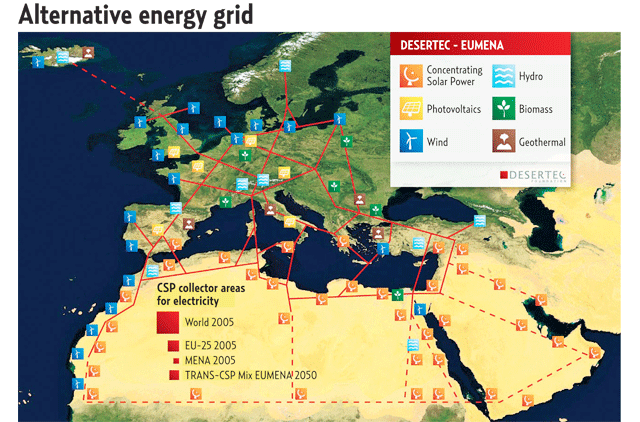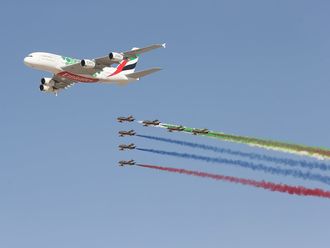
Dubai: A 400 billion-euro (Dh1.89 trillion) solar energy network could supply 15 per cent or more of Europe's and the Middle East's electricity needs by 2050.
The plan will set up a a pan-continental electricity super-grid powered by a chain of solar plants in the Gulf and North Africa. The initiative was conceived by Germany's Desertec Foundation, European governments, NGOs and corporations.
"The UAE is virtually tailor-made for solar energy. There are large spaces of desert land and lots of sunshine. It's very realistic that the UAE can become an exporter of solar energy," said chief executive officer of Enviromena Power Systems Sami Khoreibi.
The UAE and Middle Eastern countries are beginning to shift their focus towards renewable energy sources.Abu Dhabi has already set a target of 7 per cent of its energy demands from renewable sources by 2020. "We could see solar become a very large part of the energy portfolio moving forward," Khoreibi said.
Meeting demand
The UAE government predicts that 40,858 megawatts of energy will be required to meet demand by 2020, reflecting a cumulative annual growth in demand of approximately 9 per cent. "With the existing technology you can't meet 100 per cent of power needs with solar energy. It requires a mixed portfolio: a portion of that with solar, nuclear, and conventional," said Khoreibi.
A recent study by PricewaterhouseCoopers also argued that Europe and North Africa could achieve "complete independence" from fossil fuels by 2050 and that the technology necessary is already in place. The Middle East and North Africa (MENA) region holds 45 per cent of the world's energy potential from renewable sources, enough to generate more than three times the world's power demand, according to a recent study by Booz & Company.
"Within six hours deserts receive more energy from the sun than humankind can consume within a year," said Dr Gerhard Knies, Chairman of the Desertec Foundation Supervisory Board.
Environmentalists predict that the, large-scale Desertec project would face challenges on the ground.
"It's makes a lot of financial sense since there is a lot of barren land in Africa which is not occupied and it's good value on land that won't be used anyway and Africa is close to Europe so cables can run under the sea," said Apex Power Concepts General Manager Ameein Lakhani.
"But security and vandalism will be a major issue. As long as Africa is economically deprived it would be risky to leave millions of dollars worth of assets in the middle of the land."
The Desertec initiative has given itself three years to set up a policy framework within the European Union and the Middle East and North Africa to adequately fund and transport renewable energy from the desert to Europe. "The biggest challenge, however, will be to secure the subsidies that will be necessary to allow renewable energy to become cost-competitive to fossil fuels," said Mathews.
"Nevertheless, the sheer scale of the Desertec plan illustrates that the world is waking up to the fact that the Middle East has the potential to become one of the foremost producers of renewable energy."












